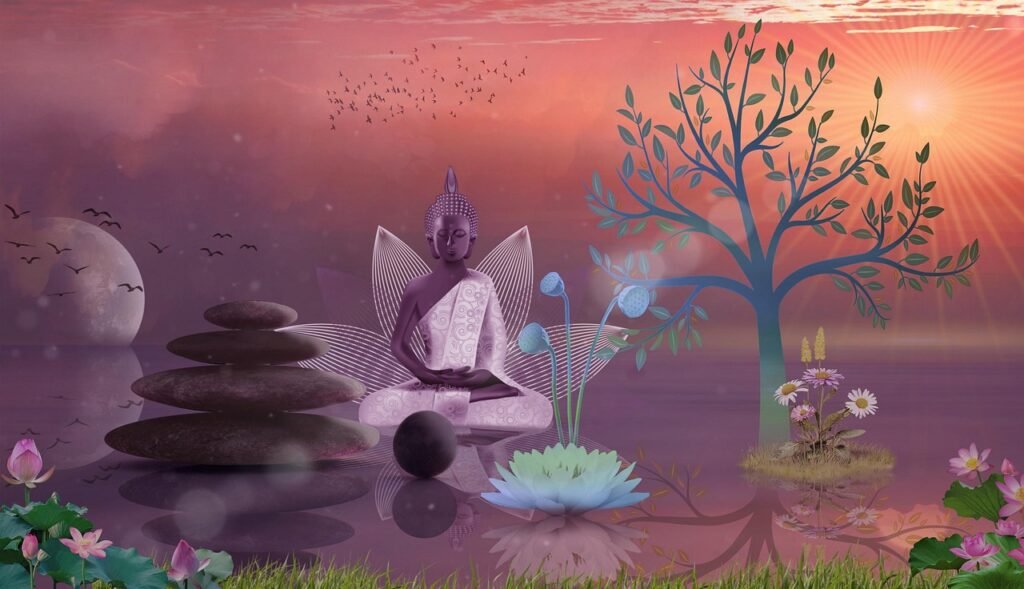
Karma is a well-known idea in many cultures around the world. It is the belief that good actions lead to good outcomes and bad actions lead to bad consequences. This belief is common in religions like Hinduism, Buddhism, and Jainism, where karma means “action” or “deed.” In simple terms, the idea is that your actions come back to you—if you do good, you’ll receive good, and if you do bad, you’ll face the results one day. While this idea has deep spiritual and religious roots, it has now become popular in everyday language, even among those who are not religious. People often use the word “karma” to describe someone getting what they deserve, whether good or bad.
In modern life, karma is more than just a religious belief. It has become a casual way to explain life events. You might hear someone say, “That’s karma!” when a dishonest person faces a setback. Social media, celebrities, and even advertisements use karma to promote the idea that the universe balances things out. But why are people so attached to this belief? What makes karma so comforting and powerful in our minds? Psychology may have the answer. Recent research has shown that our belief in karma is not always logical or fair—it’s influenced by how we see ourselves compared to others. This is called “karmic bias.”
Karmic bias is a term used to describe how people tend to apply the rules of karma differently to themselves and others. The study revealed that most people believe they deserve good karma for their kind actions. However, when they do something wrong, they are quick to make excuses or deny that they should face any consequences. On the other hand, when someone else does something wrong, people are much more likely to say, “That’s bad karma.” This shows a clear difference in how we apply the same rule—people expect rewards for themselves but punishment for others. It’s a common psychological pattern that helps us protect our self-image.
The reason behind this karmic bias is closely tied to self-image. People generally want to think of themselves as good, honest, and well-meaning. When they do something good, they feel they should be rewarded. But when they do something wrong, they find ways to justify their behavior. They might say, “I had no choice,” or “It wasn’t really that bad.” These excuses help them avoid guilt and protect their view of themselves as good people. As a result, they don’t believe they deserve bad karma. However, when it comes to others, they are often less forgiving. If someone else makes a mistake, people are quick to say, “That’s karma,” without thinking about that person’s situation.
Believing in karma can also help people feel safe in an uncertain world. Life is often unpredictable, and bad things happen without any clear reason. For some people, the idea of karma offers a way to make sense of these events. If something bad happens, they might think it’s due to something they did in the past. This belief helps them feel that life has order and fairness, even when things go wrong. In this way, karma becomes a coping tool. It reduces stress and helps people deal with difficult times, giving them hope that things will get better if they continue to do good.
Another reason why people believe in karma is due to the “just-world belief.” This is the idea that the world is fair and people get what they deserve. Many people like to believe that good people are rewarded and bad people are punished. This belief gives them a sense of control—if they do the right thing, they think they will be protected from harm. But this way of thinking can be dangerous too. When someone suffers or faces a setback, others might blame them and say it’s karma, even if the person did nothing wrong. This leads to judgment and a lack of compassion.
Karma also affects how we deal with others in relationships. When someone helps us, we often feel like we should return the favor. When someone harms us, we might think karma will take care of them instead of seeking revenge. This can promote forgiveness and patience. People may hold back their anger because they believe the universe will punish the wrongdoer. But karmic thinking can also lead to disappointment. If someone always acts kindly but keeps facing troubles, they might question if karma is real. This can lead to frustration and loss of faith in the idea.
Cultural background plays a big role in how strongly people believe in karma. In countries like India, karma is deeply connected to religious teachings and daily life. It influences how people make decisions, view their problems, and understand success and failure. In Western countries, karma is usually seen more as a spiritual or moral idea rather than a religious one. People believe in “universal energy” or “what goes around comes around,” even if they don’t follow any religion. Thanks to the internet and social media, karma has become a global idea. People share quotes, videos, and memes about karma every day, spreading the belief across cultures.
From a scientific point of view, there is no evidence that karma is a real force that affects the universe. But psychologists say that believing in karma can still have positive effects. It encourages people to be kind, stay ethical, and handle problems with a hopeful mindset. It can guide behavior and help people feel more in control of their lives, even if it’s not a proven law of nature. So, while karma may not be a scientific fact, it acts like a moral compass for many people.
To avoid karmic bias, it’s important to be aware of how we apply karma to ourselves and others. First, we should be honest about our mistakes and avoid making excuses. Accepting responsibility is a sign of maturity and self-awareness. Second, we should avoid judging others too quickly. Everyone has a story, and we should try to understand their situation before blaming them. Third, we should do good without expecting rewards. True kindness means giving without looking for something in return. Fourth, practicing gratitude can help us stay positive and focused on what we have, rather than what we think we deserve. And finally, we must accept that life is complex and not always fair. Some things are beyond our control, and that’s okay.The psychology behind karma beliefs shows how our minds shape the way we see justice, fairness, and morality. While karma gives us comfort and hope, it also creates bias in how we treat ourselves and others. Understanding this bias can help us become more compassionate, self-aware, and balanced in our thinking. Whether or not karma truly exists, living with kindness, empathy, and integrity will always bring peace and positivity into our lives.































